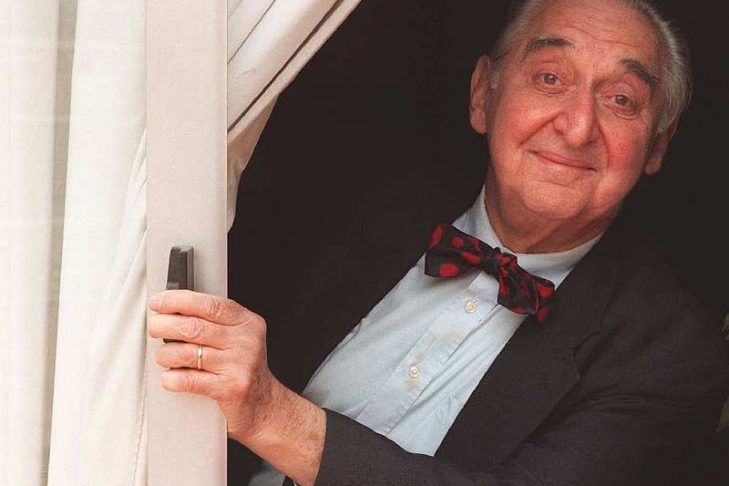As we planned our 2016 Fall Season, we eagerly awaited an evening of song, shtick, and reminiscences of the Catskills from Fyvush Finkel. Finkel, for those who don’t know him, was an iconic actor/entertainer who began his career at just 9-years-old in the Yiddish theater of the 1930s, then played the legendary Catskills hotels and went on to a career on Broadway, in movies, and TV. Perhaps best known as an Emmy-award winner on TV’s Picket Fences, Finkel spanned generations—and careers. In fact, he began his cabaret act two years ago at 91.
How sad were we yesterday (Sunday, August 14th) then, when news came of his passing at the age of 93. Of course, it left a hole in our season—but more than that, it left a hole in our hearts. Fyvush Finkel was a remarkable performer, one of the few remaining members of a generation of Jewish entertainers who got their beginnings in the Yiddish theater. He played New York’s famed Second Avenue Yiddish venues and in small stages like Pottsville, PA, then moved on to do song, dance, and shtick in the Catskills. But unlike many of his peers, Finkel had the foresight, and the talent, to know that times were changing. He landed a role in the original Broadway production of Fiddler on the Roof, playing Mordcha, the innkeeper, through most of the show’s long run. When it was revived in the 1980s, Finkel took on bigger roles until he tackled the lead, Tevye, in the national touring company.
In 1988, he won an Obie Award for his role in the New York Shakespeare Festival’s revival of the comedy Café Crown. A small movie role as a lawyer in a Sidney Lumet film then led to a new career on TV’s Picket Fences, where he played a public defender. Twice nominated for Emmy’s, he won for best supporting actor in 1994. He continued in TV and movies, then revived his Catskills persona more recently. Even heart problems and age couldn’t keep him down; he was brought in by wheelchair to perform at NY’s Metropolitan Room last March where he and his musician sons entertained for over an hour. That show was the basis for his Boston appearance in October. We will miss him, but luckily, thanks to the Internet and Netflix, there is no shortage of opportunities to see him (see below for a few).
Fyvush Finkel’s passing underscored something for us at JArts, connected to our mission and the importance of presenting iconic artists live. Finkel was (and is) a cultural treasure, someone whose talents carried him, and us, through various personas; he represented an important piece of our culture and heritage that we at JArts wanted to celebrate and open up to new generations. We were reminded of 2014, when the Boston Jewish Music Festival brought Theodore Bikel to Boston in a memorable and very special concert. His closing number, Phil Ochs’ “When I’m Gone,” was so moving there were few dry eyes in the audience. A year later, this legend of music, stage, screen and humanitarianism had passed on. We were lucky to have him here with us, to know and hear.
That’s why we were bringing Fyvush Finkel here—because we believe that just as we have a duty to present the artists creating the art of the future, we also must celebrate and preserve the culture of the past—and honor those who have produced it, particularly while they are still with us. Fyvush Finkel spent 85 years enriching us; we hoped to share that, to meet him and spend an evening learning from his talent. Sadly, we lost him before we could. But there are others like him who we will bring…because we must. They are part of the fabric that makes us and our culture.
For a few videos featuring Fyvush Finkel, here are some links:
Singing a Yiddish song:
With Theodore Bikel doing “To Life” in 2003:
March 2016 at the Manhattan Room:
This post has been contributed by a third party. The opinions, facts and any media content are presented solely by the author, and JewishBoston assumes no responsibility for them. Want to add your voice to the conversation? Publish your own post here. MORE



